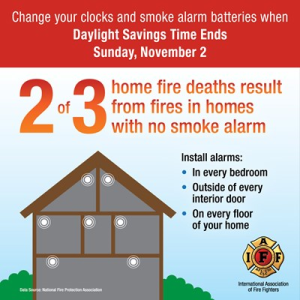Daylight Savings Time Reminder (not your clocks)
Change Your Clocks and Smoke Alarm Batteries When Daylight Savings Time Ends
 Two-thirds of home fire deaths result from fires in homes without a working smoking alarm, according to the National Fire Protection Agency (NFPA). Garland Fire Fighters Association IAFF Local 1293 fire fighters remind you to not only change your clock when Daylight Savings Time ends, but the batteries in your smoke alarms, too.
Two-thirds of home fire deaths result from fires in homes without a working smoking alarm, according to the National Fire Protection Agency (NFPA). Garland Fire Fighters Association IAFF Local 1293 fire fighters remind you to not only change your clock when Daylight Savings Time ends, but the batteries in your smoke alarms, too.
“Saving your life can be as simple as changing your smoke alarm batteries once a year and replacing smoke alarms every seven to 10 years,” says IAFF Local 1293 President David Riggs, a fire fighter at IAFF Local 1293. Special smoke alarms are even available for those who are deaf or hearing-impaired.
The NFPA reports that working smoke alarms cut the risk of dying in a home fire in half. Research has also demonstrated that photoelectric smoke alarms are more effective at warning people of smoke from smoldering fires than ionization smoke alarms. With earlier warning, people have more time to escape a burning structure and call to 9-1-1.
Your local fire fighters recommend installing a dual purpose smoke alarm in every bedroom, outside of every bedroom and on each floor of your home.
“You should also install carbon monoxide alarms in your home and check them once a month,” says David Riggs. Carbon monoxide fumes are poisonous and will increase the intensity of a fire if ignited.
More than 2,300 people die each year in home fires. Having a smoke alarm and carbon monoxide alarm that works 24 hours a day greatly increases your chance of survival if your home catches on fire.
In the case of an emergency, please call 9-1-1 for the help of your local fire fighters









Social